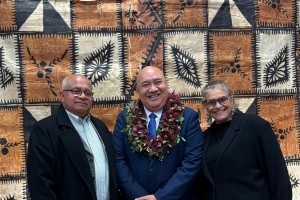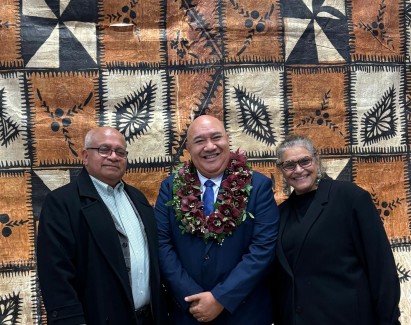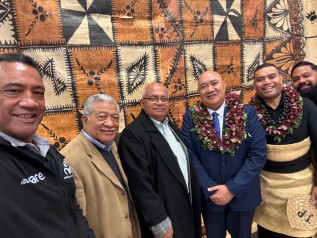
Pacific community leaders unite to support WHO Regional Director
Pacific Community leaders, including HPF’s Executive Director Sione Tu’itahi, showed their support for the World Health

Sione Tu'itahi, Dr Saia Piukala and Dr Audrey Aumua CEO of The Fred Hollows Foundation NZ at the Fale Pasifika, Auckland University.
Organisation (WHO) Regional Director for the Western Pacific, Dr Saia Ma’u Piukala at Auckland University’s Fale Pasifika on Wed, July 17.
Dr Piukala, a Tongan surgeon and former Minister of Health in Tonga, made history when he was the first Pacific person to be formally appointed to the role in January this year. His visit to NZ is part of a tour he is making to the 37 member countries in the Western Pacific Region.
Sione said it was great to catch up with Dr Piukala at the meeting. ‘I was able to to confirm to Dr Piukala our support, especially on health promotion and planetary sustainability.’
At the event at Auckland Uni Dr Piukala spoke about his vision for the region, and the opportunity that his new role brought to serve the region more broadly.
‘However, the enormity of the task is not lost on me. I don't want to be the first Pacific Islander and the last. Running around the beautiful beaches of my Island in Vava'u. Today, I stand among the giants in regional and global public health.'
Dr Piukala spoke about giving Pacific communities a stronger voice on a global level.
He said the WHO was finalising its vision document, which will be presented to the regional committee in October.
The regional action plan said Dr Piukala drew inspiration from the weaving of pandanus leaves - a practice with deep cultural and historical meaning within Pacific communities - with five strands in portrait and three strands in landscape.
Associate Professor of population health, Sir Collin Tukuitonga said it was a great honour for the University to have hosted Dr Piukala.
‘He has only just begun in his role, so it is also significant for the country that Dr Piukala will be here on the ground.’
 Dr Piukala returned to Auckland from Wellington on Saturday, Jul 20, where he met with Pacific community leaders at a meeting organised by the Tongan community.
Dr Piukala returned to Auckland from Wellington on Saturday, Jul 20, where he met with Pacific community leaders at a meeting organised by the Tongan community.
Sione said they organised this meeting so Dr Piukala could meet Pacific leaders and Pacific health providers, not only to honour his role, but to explore ways of collaborative support.
Under Dr Piukala’s leadership, the WHO aims to strengthen health care in the Western Pacific by integrating efforts to achieve transformational primary health care and universal health coverage.
This will help to address the leading causes of disease and mortality in the Region, including noncommunicable diseases (NCDs). NCDs, including diabetes, cardiovascular diseases, cancer and chronic respiratory illnesses, together account for nearly nine out of 10 deaths in the Region.
The new Regional Director will also focus efforts on healthy ageing and actions to address mental health and oral health, as well as maternal and child health, immunization and communicable disease prevention and control. WHO in the Region will also leverage health technology to address inequities, including potential entry points for private sector engagement.
Accelerating action on climate change, the environment and health is another major focus for Dr Piukala. His administration will review current initiatives and identify new opportunities to support country efforts. A cross-cutting, integrated strategy will be developed, and engagement with internal and external stakeholders intensified to enable new technical and diplomatic mechanisms for accelerating action on climate change and health.
WHO Director-General Dr Tedros Adhanom Ghebreyesus said he looked forward to working closely with Dr Piukala to promote and protect the health of people across the Region